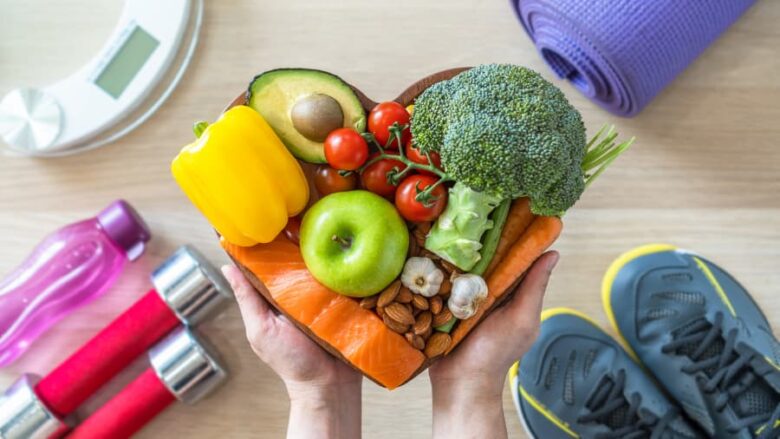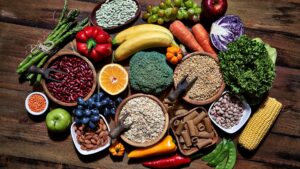One of the hardest-working organs in the human body is the heart. It pumps blood around every day, delivering oxygen and keeping you alive. Like any hard-working machine, it needs the right fuel to function properly. That’s what a heart-healthy diet is all about.
Heart-healthy eating can be delicious! You can support your heart and enjoy delicious food at the same time by choosing from a variety of nutritious foods. Whether you’re looking to lower your cholesterol or live a healthier lifestyle, it’s important to understand why certain foods are good for your cardiovascular system. Let’s take a closer look at a heart-healthy diet and the best foods to keep your heart happy and strong!
What Makes a Food Heart-Healthy?
Heart-healthy foods contain substances that are good for your heart. Essential fatty acids, fibre, vitamins and minerals are common. Healthy fats are important. Foods rich in omega-3 reduce inflammation and cholesterol. Fat keeps blood vessels flexible.
Fibre is also important. It lowers bad cholesterol and regulates blood sugar levels. Whole grains, fruits, and vegetables are rich in this vitamin. Many foods contain antioxidants, which protect cells from free radical damage. These protective chemicals are found in large quantities in berries and leafy greens. Heart-healthy foods are low in added sugars and trans fats. This makes them good for heart health and daily energy balance.
Top Foods for a Strong Heart:
A. Fatty fish
Fatty fish is rich in heart-healthy elements. Omega-3 fatty acids reduce inflammation and blood pressure. Essential fats can also prevent atherosclerosis. Healthy options include salmon, mackerel, sardines, and herring. They are flexible, tasty, and good for the heart. You can grill them, bake them, or add them to salads for extra flavour.
Adding fatty fish to your diet twice a week can improve your cardiovascular health. These fish provide protein without saturated fat. Keep things interesting by changing up your preparations. A simple lemon dill sauce or spicy marinade can enhance any healthy meal.
B. Green Leafy Vegetables
Green leafy vegetables are packed with heart-healthy nutrients. Spinach, kale, and Swiss chard are rich in potassium, magnesium, and folate. These nutrients help regulate blood pressure and cardiovascular function.
Green leafy vegetables are rich in antioxidants and can fight oxidative stress. Chronic inflammation can lead to heart disease, so this is crucial. Fibre aids digestion and lowers cholesterol, which is important for heart health. These colourful vegetables are easy to add to your diet. Add them to smoothies or salads for instant nutrition. To enjoy their delicious flavour and health benefits, sauté them with garlic or use them as the base for a grain bowl.
C. Whole Grains
Whole grains are good for heart health. Examples include brown rice, quinoa, oats, and whole wheat bread. Whole grains contain more fibre and nutrients than refined grains because the bran and germ are retained. Fibre is needed to control cholesterol levels. LDL cholesterol decreases and HDL cholesterol increases. This balance significantly reduces the risk of heart disease.
Whole grains contain antioxidants and vitamins that can improve heart and blood vessel health. They regulate blood pressure and improve blood vessel function. It’s easy to add healthy grains to your meals. Swap white rice for brown rice or oats for a hot breakfast. Over time, small changes can improve heart health.
D. Berries
Berries are not only delicious; they’re also good for your heart. The small fruit, rich in antioxidants, can lower blood pressure and reduce inflammation. Strawberries, blueberries, raspberries, and blackberries are all unique. Their bright colour indicates that they are rich in flavonoids, which can improve blood vessel function.
Berries are very easy to consume. Add a handful to your cereal or smoothie for an extra nutritional boost. Delicious eaten on its own or with yoghurt and salad. Naturally sweetened to satisfy your cravings, with no added sugar. Make berry water or jam and eat them as small candies. Great taste and heart-healthy minerals in every bite.
E. Seeds and Nuts
Nuts and seeds are not only a delicious snack; they are also rich in heart-healthy minerals. They are high in healthy fats, fibre, and protein, which can lower cholesterol. The best choices are almonds, walnuts, flaxseeds, and chia seeds. The omega-3 fatty acids in walnuts can improve cardiovascular health. Lignans from flaxseed can lower blood pressure.
Include them in your diet. Mix them with your cereal or smoothie for an extra crunch. They effortlessly add flavour and nutrition to salads or yoghurt bowls. Due to their high calorie density, they should be consumed with caution without sacrificing health benefits. Keep portion sizes moderate to avoid overeating.
Nutritional Tips for These Foods
Simple, yet delicious, heart-healthy foods to add to your diet. Add fatty fish to your weekly diet. Two servings of salmon, mackerel, or sardines are recommended. Blend leafy greens or add them to smoothies or salads. Kale and spinach are nutritious, but they don’t taste as good. Whole grains can easily replace processed carbohydrates. Use brown rice or whole wheat pasta instead of white rice.
Berry snacks are delicious. Fresh blueberries or strawberries can sweeten and nourish yoghurt or cereal. Nuts and seeds make great on-the-go snacks. Use small bags to satisfy your hunger, but watch your portion sizes, as they are high in calories. Try these tips slowly, make changes as needed, and enjoy discovering new flavours and recipes.
Other Heart-Healthy Lifestyle Benefits
A healthy heart lifestyle is about more than just food. Regular exercise is essential. Try to get 150 minutes of moderate-intensity exercise each week. This can be a brisk walk or a bike ride. Stress management is also important. Chronic stress can be bad for your heart. Yoga, meditation, and deep breathing exercises can help relieve stress.
The quality of your sleep is also important. Lack of sleep can lead to heart disease. It is important for your health to get seven to nine hours of sleep every night. Hydration is also important. Drinking enough water can improve your circulation and heart function. Regular visits to your doctor are necessary to check your cholesterol and blood pressure and keep your heart healthy.
Conclusion
Small changes to your diet can significantly improve your heart health. Healthy choices have a positive domino effect. Improve your diet by adding fatty fish and leafy greens. These choices nourish and improve cardiovascular health.
It is important to watch your diet and control the portions you eat. Knowing what you eat can help you make better daily decisions. These dietary changes, combined with exercise, can have even more beneficial effects. Enjoying activities can help balance your heart health. Even small changes, such as switching from processed snacks to nuts or berries, can help. It is important to make an informed decision that fits your lifestyle.
FAQs
1. What are some quick, heart-healthy meals?
Breakfast can easily consist of a salmon salad with leafy greens and berries or oatmeal with nuts and seeds.
2. How often should I eat fatty fish?
Eat salmon or mackerel at least twice a week for omega-3 fatty acids.
3. What whole grains are best for a healthy heart?
Brown rice, quinoa, barley, and oats contain more fibre than refined grains and can lower cholesterol.
4. Are there heart-healthy foods I can eat?
Absolutely! Instead of processed snacks full of sugar and salt, try mixed nuts, fresh fruit, or vanilla popcorn.
5. Should all unhealthy foods be eliminated?
Your intake of saturated fat, carbohydrates, and sodium should be limited, but eating something different every now and then can make your dietary changes more sustainable. Balance is key!




